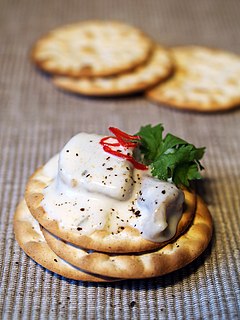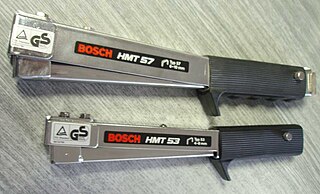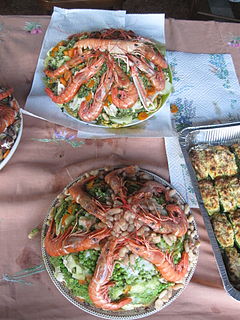This page is based on this
Wikipedia article Text is available under the
CC BY-SA 4.0 license; additional terms may apply.
Images, videos and audio are available under their respective licenses.

Biscuit is a term used for a variety of primarily flour-based baked food products. The term is applied to two distinct products. This article covers the type of biscuit found in Africa, Asia and Europe, which is typically hard, flat and unleavened. In North America, a biscuit is typically a soft, leavened quick bread, and is covered in the article Biscuit (bread).

The United States military ration refers to various preparations and packages of food provided to feed members of the armed forces. U.S. military rations are often made for quick distribution, preparation, and eating in the field and tend to have long storage times in adverse conditions due to being thickly packaged and/or shelf-stable. The current ration is the Meal, Ready-to-Eat (MRE).

Operation Hardtack II was a series of 37 nuclear tests conducted by the United States in 1958 at the Nevada Test Site. These tests followed the Operation Argus series and preceded the Operation Nougat series.

A water biscuit or water cracker is a type of biscuit or cracker. Water biscuits are baked using only flour and water, without shortening or other fats usually used in biscuit production. They are thin, hard and brittle, and usually served with cheese or wine. Originally produced in the 19th century as a version of the ship's biscuit, water biscuits continue to be popular in Ireland and the United Kingdom, with the leading brands selling over seventy million packets a year.
Seabiscuit was a champion Thoroughbred racehorse in the United States.

Hard Tack and Coffee: The Unwritten Story of Army Life (1887) is a memoir by John D. Billings. Billings was a veteran of the 10th Massachusetts Volunteer Light Artillery Battery in the American Civil War. Originally published in 1888, Hard Tack and Coffee quickly became a best seller, and is now considered one of the most important books written by a Civil War veteran. The book is abundantly illustrated by the pen and ink drawings of Charles Reed, also a veteran, who served as bugler in the 9th Massachusetts Battery. Reed received the Medal of Honor for saving the life of his battery commander at Gettysburg. Hard Tack and Coffee is not about battles, but rather about how the common Union soldiers of the Civil War lived in camp and on the march. What would otherwise be a mundane subject is enlivened by Billings' humorous prose and Reed's superb drawings which are based on the sketches he kept in his journal during the war.
The B46 nuclear bomb was an American high-yield thermonuclear bomb which was designed and tested in the late 1950s. It was never deployed. Though originally intended to be a production design, the B46 ended up being only an intermediate prototype which was test fired several times. These prototypes were known as TX-46 units (Test/Experimental).

Fish and brewis is a traditional Newfoundland meal consisting of cod and hard bread or hard tack. With the abundance of cod around the coasts of Newfoundland and Labrador it became synonymous with many Newfoundland households as a delicacy to be served as a main meal.

A Hammer tacker is a very simple device that has an approximately 300 mm (12 inch) handle and a head, which, when it comes into contact at high speed with a hard material, inserts a staple into said material. Usually, the hammer tacker is used like a hammer to apply staples.

Foods of the American Civil War were the provisions during the American Civil War with which both the Union and Confederate armies struggled to keep their soldiers provisioned adequately.

"Hard Tack, Come Again No More" is an American Civil War-era parody of the song "Hard Times, Come Again No More." First called "Hard Crackers, Come Again No More!", it is a sarcastic complaint about the quality of some of the provisions provided by military contractors. The authors of the many verses of the parody are unknown, although the first version is often attributed to Josiah Fowler of the First Iowa Infantry dating to just after the Battle of Boonville, June 1861.
Purity Factories Limited is a food processing company based in St. John's, Newfoundland.
Operation Hardtack can refer to:

Cappon magro [kapˌpom ˈmaːɡro], is an elaborate Genoese salad of seafood and vegetables over hardtack arranged into a decorative pyramid and dressed with a rich sauce.
Right Tack (1966–1985) was an Irish-bred, British-trained Thoroughbred racehorse and sire. In a career that lasted from June 1968 to October 1969 he ran twelve times, winning eight races and finishing second three times. As a two-year-old he won his last five races included the Middle Park Stakes and was rated the second-best British colt of his generation. In the following year he became the first horse to win both the 2000 Guineas at Newmarket and the Irish 2000 Guineas at the Curragh. After being retired from racing he stood as a breeding stallion in Ireland and Australia.
This is a list of military food topics. Military food topics include military rations, how military foods are prepared, distributed and utilized.

Cheese and crackers is a common dish consisting of crackers paired with various or multiple cheeses. It is also known as cheese and biscuits outside the United States and Canada. Historically the fare of sailors, soldiers, and pioneers, it had become a regular menu item in American restaurants and bars by the 1850s. It is prepared using various types of cheeses, and is often paired with wine. Mass-produced cheese and crackers brands include Handi-Snacks, Ritz, Jatz and Lunchables.











